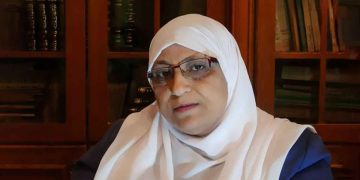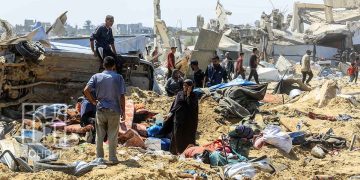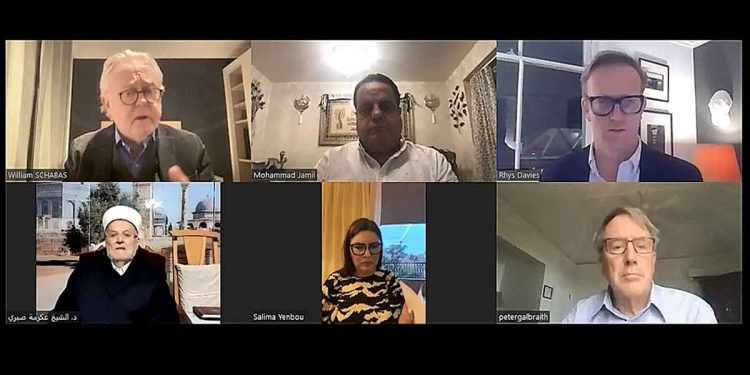On Thursday 8 December, Arab Organisation for Human Rights in the UK (AOHR UK) held a webinar to discuss a complaint submitted by the organisation to the International Criminal Court (ICC) concerning the systematic attacks organised by Israeli politicians, military figures, and settler groups against al-Aqsa Mosque, which aim at changing the fundamental reality of the mosque and its surroundings.
The responsible legal team is led by Professor William Schabas. The webinar was moderated by British lawyer Rhys Davis, of Temple Garden Chambers, and was attended by parliamentarians, jurists, and diplomats.
In his opening remarks, Mr. Mohamed Jamil, Director of the AOHR UK, underscored the importance of the complaint, which comes after decades of Israeli aggression against the Palestinian people and their religious sites, the most important of which is the al-Aqsa Mosque.
Mr. Jamil referred to the impunity enjoyed by Israeli officials, which encourages both civilian and military leaders to commit further violations against Palestinians without fear of prosecution. Israeli officials are practically never held accountable for any crime they have committed in the Occupied Palestinian Territories (OPT), Mr. Jamil said.
Whether from the right or the left, successive Israeli governments have permitted extremist settler groups to storm Al-Aqsa Mosque, thereby offending it sanctity, Mr. Jamil continued. Those groups are often protected by Israeli security forces who themselves have committed numerous violations against Palestinians in the mosque’s vicinity, including even the use of live fire, he continued.
Mr. Jamil warned that, with Netanyahu’s formation of a new government, aggressions against the mosque and those Palestinians worshiping there are set to increase. He further stressed that the Palestinian people are angry at the double standards of United States and the West in dealing with human rights violations: whilst the Israelis who commit brutal crimes enjoy immunity, Palestinians are being subjected to an ongoing collective punishment.
Mr. Jamil concluded his contribution by calling on the ICC’s prosecutor to thoroughly investigate the case the organisation has put before the court.
In his contribution, Prof. William Schabas told the webinar audience that, “the complaint that was submitted this morning to the office of the prosecutor of the International Criminal Court consists of 40 pages, as based on video and photos from the ground, eyewitnesses’ testimonies, and various documents concerning al-Aqsa Mosque issued by bodies such as UNESCO and the [UN’s] General Assembly.”
Prof. Schabas explained that the intention of the complaint is to draw the ICC’s attention to the systematic violations occurring at al-Aqsa. He noted that no apparent action has been taken by the court following its recent decision to open an investigation into the issue of war crimes in Palestine.
The professor argued that the AOHR UK’s case is a test of the court’s integrity. The complaint, which concerns attacks against sanctified places and the right to practice religious rites, is similar to a case involving Mali heard by the ICC in 2012. Will the ICC show itself to be consistent in its treatment of such issues?
Prof. Schabas concluded by referring to the escalation of crimes committed by Israeli officials as a result of their apparent legal impunity. Prof. Schabas underlined that those officials are ultimately responsible for the various violations to have occurred in and around al-Aqsa.
In his own contribution to the discussion, Sheikh Ekrima Sa’id Sabri, the former grand mufti of Jerusalem, argued that the AOHR UK’s complaint is of great importance for the preservation of Palestinians’ rights. Throughout the long decades of Israeli occupation forces’ attacks against the mosque, there has been no effort on the part of the international community to “protect Al-Aqsa or protect worshipers”. Sheikh Ikrima Sabri added that many of the crimes committed by Israeli forces in and around the mosque are well-documented.
Sheikh Sabri argued that much of international law is “just and civilized”, but that in the case of Palestinian, there is the “need for an effective international force to implement them, in order that justice can be achieved.”
He concluded his contribution by saying that, “we hope that the International Criminal Court’s investigation into these incidents will be impartial and independent, and that it will not yield to any political pressure.”
In her own contribution, the French MEP Salima Yenbou, stated that this year has proven extremely bloody for the Palestinian people, due to the escalation of Israeli violence.
Ms. Yanbou referred to her recent official visit to Jerusalem, during which she was attacked by Israeli settlers: “They violently targeted us (…) It was terrifying for me, but the most terrifying thing is that although I was able to leave safely, this reality experienced by Palestinians on a daily basis”, the MEP said.
Ms. Yanbou concluded her intervention by saying, “what is happening in Al-Aqsa Mosque is a vivid example of what the Palestinians are subjected to at every level.”
The webinar’s final speaker was former US Ambassador Peter Galbraith. Mr. Galbraith stressed that the current Israeli government is practicing systematic, escalating violence against Palestinian civilians.
Mr. Galbraith explained that Netanyahu’s newly-formed government includes the far-right Itamar Ben-Gvir who, infamously, has a history of celebrating Baruch Goldstein, an American-Israeli terrorist who murdered 29 Muslim worshipers at the Ibrahimi Mosque in 1994.
Arab Organisation for Human Rights in the UK hereby expresses its deep gratitude to all of the evening’s speakers, and to all attendees.






























